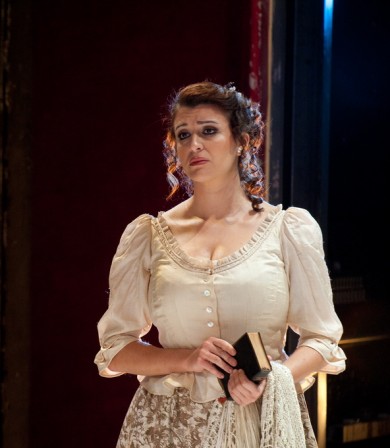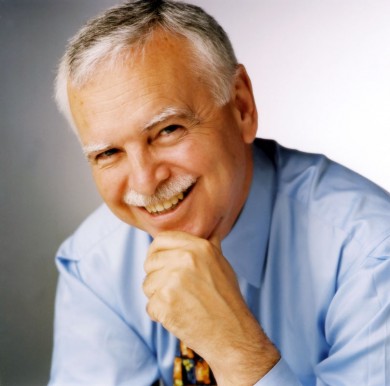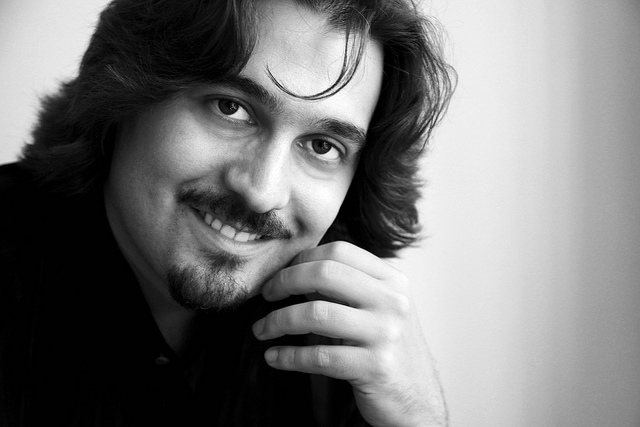Florida Grand Opera to open season in Spanish style with “Luisa Fernanda”

Amparo Navarro stars in the title role of Torroba's "Luis Fernanda," which opens Florida Grand Opera's season Saturday night.
The idea had been percolating for a long time in Miami, and a casual conversation last year with superstar tenor Placido Domingo sealed the deal.
On Saturday night Florida Grand Opera will make its first foray into zarzuela, the centuries-old, Spanish-bred style of opera whose mix of spoken text and tuneful song resembles operetta. The company’s 71st season opens with Luisa Fernanda by Federico Moreno Torroba. The popular zarzuela was composed in 1932 and in less than two hours manages to pack in enough political intrigue and thwarted romantic passion to satisfy Verdi.
Domingo himself will appear for one gala performance Nov. 15 as Vidal Hernando, the wealthy landowner who fights for the hand of the fair Luisa.
“We’ve actually talked about zarzuela for a number of years,’’ said Robert Heuer, Florida Grand Opera’s general director and CEO. “As you can imagine, here in South Florida with our large Hispanic community there’s often been people who ask, ‘Why haven’t you done zarzuela? You’ve done Viennese operetta.’”
Heuer held off mainly because a small, local opera company specializing in zarzuela had been active in the area for decades. But as their performance schedule dwindled in recent years, he sensed it was time to bring zarzuela to FGO.
The idea for the current production came about in a 2010 conversation Heuer had with Domingo at an Opera America conference in Los Angeles. The Spanish-born tenor’s parents ran a zarzuela company, and he has long championed the art form in the U.S. Through recordings and performances the singer is largely responsible for growing interest in zarzuela among American opera lovers.
Heuer asked Domingo for advice about which zarzuela would be best for Florida Grand Opera’s first venture into this unfamiliar musical territory.
“Without hesitation, he said, Luisa Fernanda,” said Heuer. “ ‘And if you do it,’ he said, ‘I will sing one performance for you.’” Domingo, who made his Florida Grand Opera debut in 1967, last appeared with the company in 1984.

Robert Heuer
Luisa Fernanda appealed to Heuer for several reasons. “It’s closer in some ways to an opera than a lot of zarzuela,” he said. “It’s a very dramatic score and certainly musically challenging.”
It also fits with what Heuer states is the company commitment to presenting new or unfamiliar works. “One of the things we’ve tried to do over the years,” said Heuer, “is to introduce operas that haven’t been done here before. So it’s an opportunity to introduce some music and an opera to the non-Hispanic audience who may have had no exposure to zarzuela.”
Heuer estimates that more than 50 percent of the company’s current audience is Hispanic, and so, for many of them, Luisa Fernanda is an old friend.
Florida Grand Opera has been spreading the news about the opera in extensive outreach events. These usually include a bit of video from the production that the company will be presenting. Directed by Emilio Sagi, it had its premiere in Madrid in 2003 and has been seen in Washington, Los Angeles and Caracas, Venezuela.
“Whenever we show the video,” said Heuer, “people in the audience actually sing along. This particular zarzuela is well known and is a favorite. Interestingly, it’s beloved throughout the Hispanic culture, whether that’s Spain or South America or Central America or the Caribbean.”
Torroba’s original timeframe of 1860s Spain is retained, and the elaborate costumes are done in shades of white and cream. The set is relatively minimalist in terms of scenery. Light is a major element, with a backdrop that creates an atmosphere of glowing sunshine or nocturnal shadows. As is the case with all FGO productions, supertitles will be projected in both Spanish and English.
Soprano Amparo Navarro sings the title role, Antonio Gandia appears as her young lover, Javier, and Angel Odena takes the role of Vidal Hernando in all performances except the Nov. 15 gala with Domingo.

Conductor Pablo Mielgo
Spanish-born conductor Pablo Mielgo, whose busy career includes a post as assistant to James Conlon, music director of both the Los Angeles Opera and the Ravinia Festival, makes his Florida debut with Luisa Fernanda. But he has been conducting zarzuela since he was a 17-year-old student tapped to fill in for a maestro who cancelled at a local music festival.
“I had so much fun,” he said. “You can’t be Spanish or in Spain and start a career there and not do zarzuela. It is such a part of our culture.”
Most of the opera performances Mielgo conducts are mainstream repertoire, but he welcomes the chance to do zarzuela.
“We Spanish people don’t have so many chances to do opera in our own language. Always,” he joked, “we are fighting against the Italian and the German. So it’s relaxing, it’s comfortable. It’s the perfect jacket for us.”
Typically, zarzuela has a great deal of spoken text, said Mielgo, sometimes as much as half of the entire libretto. In this version of Luisa Fernanda, the text has been cut to about 20 percent of the stage action. “The rhythm of the whole production is really fast,” Mielgo said. “It’s very easy to follow.”
Traditional opera companies like Florida Grand Opera have been thinking beyond the standard German, French, and Italian grand opera tradition in recent years. Stephen Sondheim’s Sweeney Todd is turning up more often on opera house stages, and this season Lyric Opera of Chicago will present Jerome Kern’s Show Boat in a production directed by Francesca Zambello. Operettas by Gilbert and Sullivan and works such as Die Fledermaus or The Merry Widow are popping up on opera house schedules as well.
“There is a long tradition in opera of including lighter work in a season’s repertoire,” said Marc Scorca, president and CEO of Opera America, a service organization whose memberships includes more than 100 professional American opera companies large and small.
“You look at the Viennese operettas, the works by Lehar and Strauss that were done steadily in the first half of the 20th century by American opera companies. They were very much a part of the opera company repertoire — just as some overtures and rather light music used to be part of the symphony orchestra repertoire. Mixing up the heavy opera and the lighter opera was certainly a part of the tradition.”
In the past 20 years or so, Scorca said, Sondheim has become part of that mix, filling the slot for familiar, popular works once occupied by Gilbert and Sullivan operettas.
It’s no surprise, Scorca said, that zarzuela is beginning to enter the repertoire as well.
“In cities that have an increasingly large and very prosperous Spanish-speaking population,” he said, “the zarzuela is, in certain ways, vernacular — just as Gilbert and Sullivan and Sondheim were vernacular.”
Ticket sales for Luisa Fernanda have been “very strong,’’ said Heuer. “A lot of people seem to be new to us, which is exactly what we were hoping for. They’re people who might never have come to the opera but knew the zarzuela. We were hoping that they would come and try it and that would be a way for us to connect with them.”
“Presenting zarzuela is a way to engage a new and important audience in many cities around the country,’’ said Scorca. “And doing so extends a rich tradition in 20th century American opera.”
Luisa Fernanda opens 7 p.m. Nov. 12 and will will run through Nov. 26 at the Adrienne Arsht Center in Miami and Dec. 1 and 8 p.m. at the Broward Center in Fort Lauderdale. fgo.org; 800-741-1010.
Tickets for the Nov. 15 gala performance with Domingo are sold out execpt for VIP tickets that include the performance, pre-opera reception and post-performance gala dinner. For information, call 305-854-1643.
Wynne Delacoma was the classical music critic for the Chicago Sun-Times from 1991 to 2006. She is a regular contributor to Chicago Classical Review, and continues to write for the Sun-Times, Musical America.com and other outlets. Since 1982 she has been an adjunct faculty member at Northwestern University’s Medill School of Journalism teaching arts reporting and criticism as well as general reporting.

Photo: Javier del Real
Posted in Articles
Leave a Comment
Tue Nov 8, 2011
at 12:22 pm
No Comments




